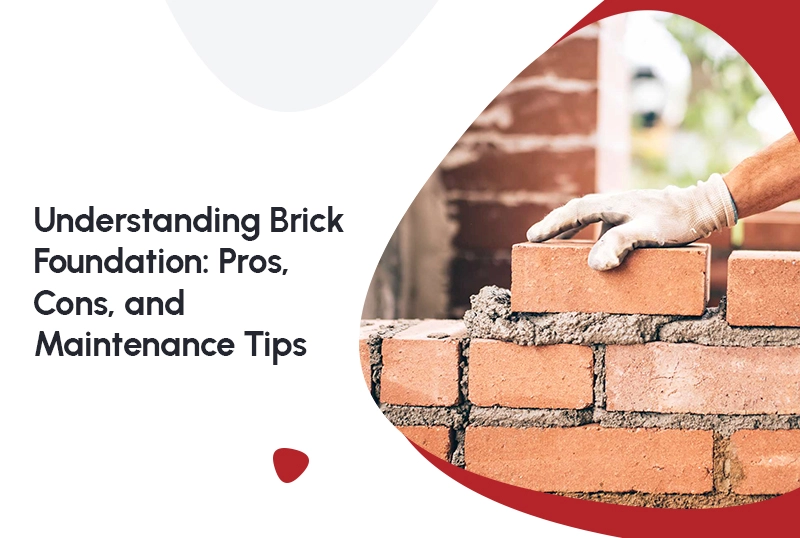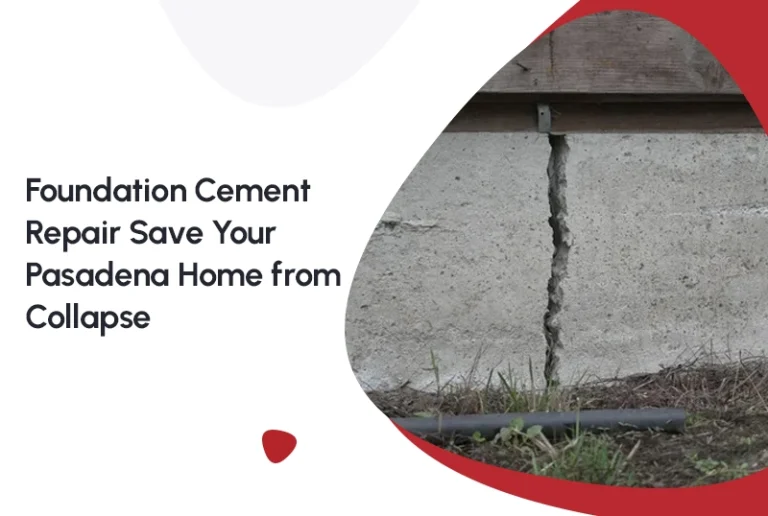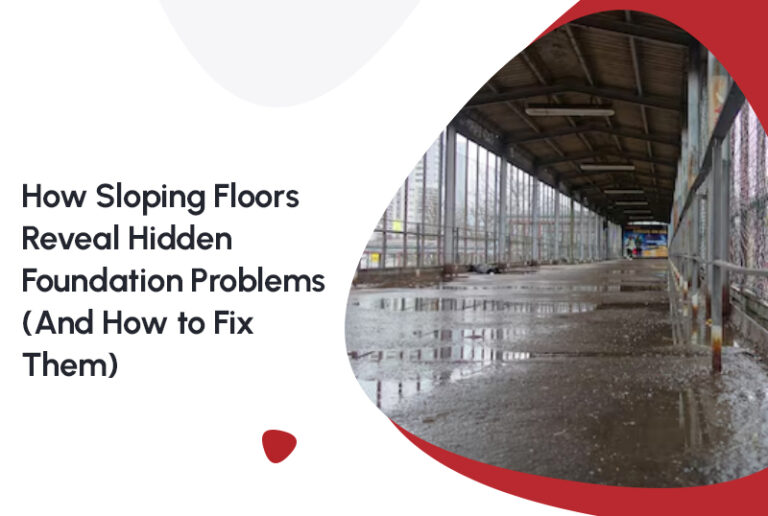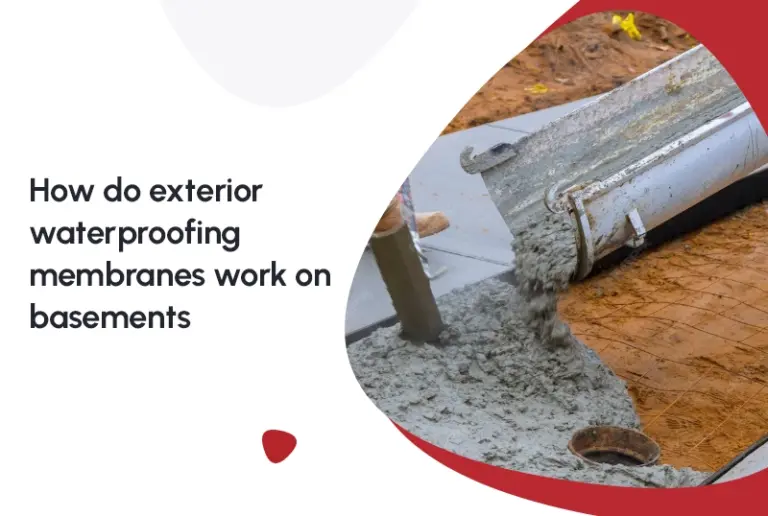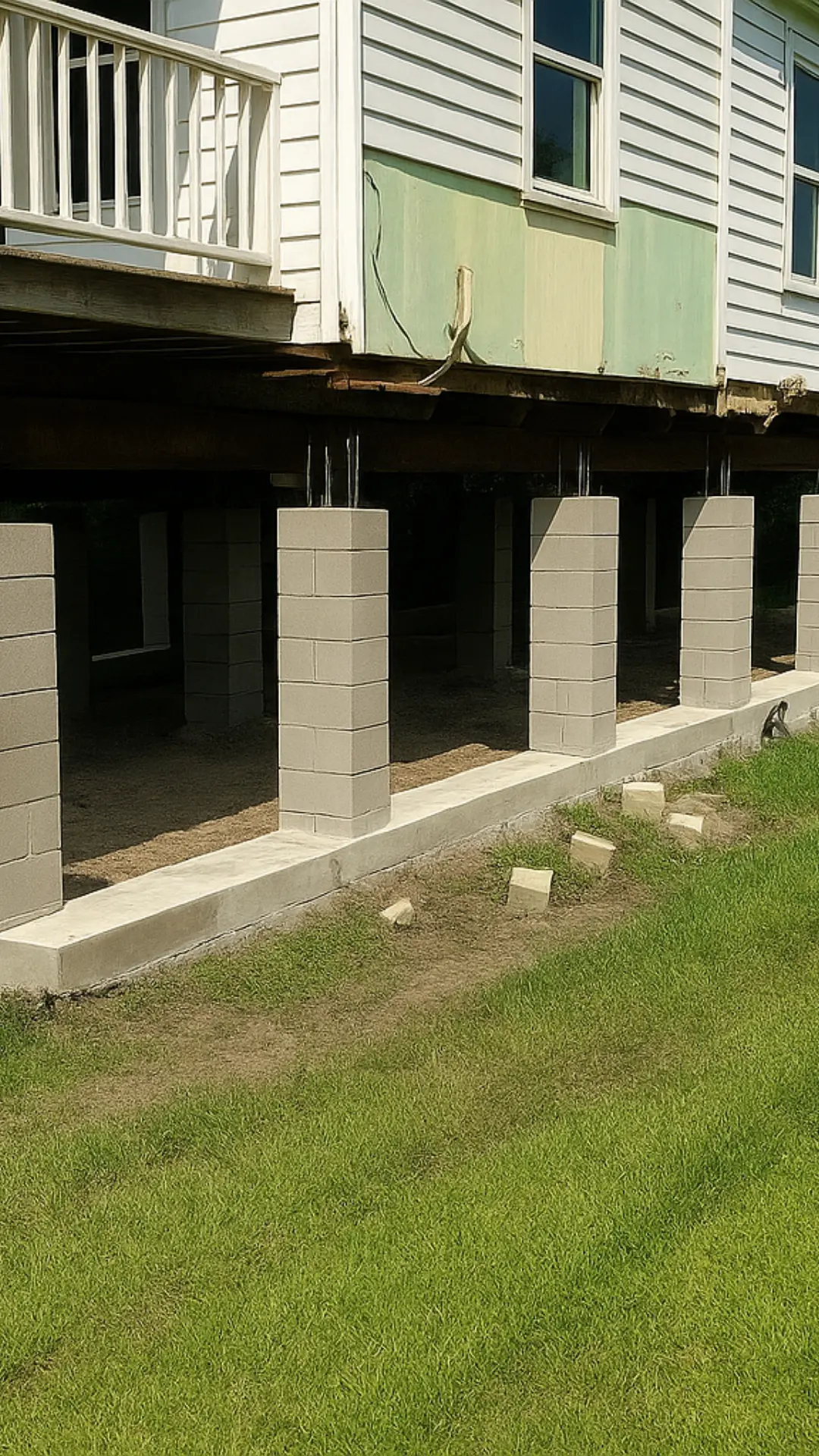A brick foundation is one of the most traditional and reliable foundation types used in residential construction. Known for its durability and timeless appearance, brick foundations have been a popular choice for centuries. But like any foundation type, brick foundations come with their own set of advantages and challenges. Whether you’re building a new home or maintaining an existing structure, understanding the pros, cons, and maintenance tips for brick foundations will help ensure your home remains stable and secure.
What is a Brick Foundation?
A brick foundation is a type of structural base where bricks are used as the primary building material to support a home. It typically consists of several courses (layers) of bricks bonded together with mortar, forming a wall that supports the structure above. The brickwork rests either directly on compacted soil or on a concrete footing and is commonly used in older homes built before the widespread use of poured concrete foundations.
While bricks themselves are incredibly durable, the long-term stability of a brick foundation depends heavily on construction quality, drainage systems, soil conditions, and ongoing maintenance. Over time, environmental factors like shifting soil, groundwater, and freeze-thaw cycles can impact the integrity of a brick foundation. As such, homeowners must be proactive in caring for it to prevent damage or the need for costlyfoundation repair.
Pros of Brick Foundations
When properly constructed and maintained, brick foundations offer several benefits:
1. Durability
Bricks are fired at high temperatures, making them resistant to fire, weather, and time. A well-maintained brick foundation can last over a century. Its resilience to everyday wear and tear means fewer repairs in the short term, and with the right care, they age exceptionally well.
Brick also has great compressive strength, which means it’s excellent at bearing heavy loads. This makes it a smart choice for multi-story homes or structures with heavy roofing systems.
2. Aesthetic Appeal
A brick foundation adds character and charm to a home. The natural texture, earthy tones, and historic look of brickwork contribute to a classic aesthetic that many homeowners value. Unlike concrete, which can appear dull or industrial, brick gives a timeless appearance that suits traditional and colonial-style homes beautifully.
In some regions, exposed brick foundations are even considered a premium feature that adds to property value.
3. Resistance to Fire and Pests
Unlike wood-based materials, brick is non-combustible. It does not burn, melt, or release toxic fumes in the event of a fire. This fire resistance can improve home safety and reduce the risk of devastating structural loss.
In addition, bricks do not attract termites, carpenter ants, or other pests that commonly plague wood-based foundations. With fewer vulnerabilities to infestation, brick foundations provide a layer of protection against structural pest damage.
Cons of Brick Foundations
Despite their many benefits, they come with their own set of challenges that homeowners should consider.
1. Susceptibility to Cracking
While bricks themselves are durable, the mortar that binds them can degrade over time. Shifting soil, freeze-thaw cycles, poor drainage, and even seismic activity can cause cracks in the mortar or bricks. These cracks may compromise structural integrity and require foundation repair.
Small cracks can be repaired with tuckpointing or mortar patching, but larger cracks that run through the bricks themselves often signal more serious issues such as settling or foundational movement.
2. Moisture and Water Damage
Bricks are porous and can absorb water if not properly sealed. Over time, water seepage can damage the interior of the home, encourage mould growth, and weaken the mortar. Moisture can also lead to efflorescence — a white, chalky substance that appears on brick surfaces, indicating that water is moving through the foundation.
In colder climates, moisture inside bricks can freeze and expand, causing spalling — where the outer layer of brick flakes or peels off. This not only affects the structural soundness of the wall but also the appearance of the home.
3. Foundation Settlement
Brick foundations are vulnerable to uneven settling. This can occur due to poor soil compaction during construction, erosion, tree roots, or water intrusion. As the soil beneath the foundation moves or shifts, parts of the brick wall may sink or crack, leading to uneven floors, bowed walls, or misaligned doors and windows.
In severe cases, pier & beam foundation repair repair may be necessary to stabilize the structure and prevent further movement.
Maintenance Tips for Brick Foundations
Regular maintenance is key to ensuring the longevity of your brick foundation. Below are some important maintenance tips:
1. Inspect Regularly for Cracks
Cracks in the brick or mortar joints should never be ignored. Perform visual inspections at least twice a year — once in the spring and again in the fall. Look for horizontal, vertical, or stair-step cracks. If you notice any, document their size and location.
Hairline cracks may not be urgent but should be monitored over time. Larger cracks or those wider than 1/4 inch warrant professional evaluation. Early intervention can save you from extensive foundation repair down the road.
2. Maintain Proper Drainage
Water is the number one enemy of all foundation types. Ensure that your gutters and downspouts are functioning properly and that water is being directed away from the foundation. Downspouts should extend at least 5 feet from the base of the home.
Also, assess the slope of the ground surrounding your home. The soil should slope away from the structure by at least 6 inches over the first 10 feet. If not, regrading may be necessary.
3. Use a Waterproofing Solution
Applying a breathable waterproofing sealant can help protect the brick and mortar from absorbing moisture. These products create a protective barrier while still allowing the bricks to expel any internal moisture.
Avoid paint-based coatings that trap moisture, as these can accelerate deterioration. Opt for silane or siloxane-based waterproofing agents designed specifically for masonry surfaces.
4. Check for Soil Movement
Uneven or eroding soil around your home can cause foundation instability. Walk the perimeter of your house after heavy rains to check for pooling water or washed-away soil. Installing a French drain or catch basin system may be necessary in problem areas.
If you observe sloping floors, cracks near windows or doors, or sudden sticking of doors, you may be dealing with soil settlement. Contact a foundation repair specialist for an inspection.
5. Monitor for Pest Activity
Even though bricks resist pests, deteriorating mortar can create small gaps that rodents or insects can exploit. Look for small holes, tunnels, or signs of nesting near the base of your foundation. Sealing these gaps and performing routine pest control inspections can protect the home from hidden invasions.
How to Repair a Brick Foundation
If your brick foundation has experienced issues such as settling, cracking, or moisture damage, professional repair is crucial to restore its integrity. Here are some common repair solutions:
1. Foundation Leveling
If your foundation has settled unevenly, professionals may use slab jacking or pier systems to level it. Slab jacking involves pumping grout beneath the settled portion to raise it, while pier systems involve driving steel or concrete piers deep into the ground to stabilize and support the structure.
2. Crack Repair and Mortar Injection
For minor to moderate cracking, tuckpointing is commonly used. This involves removing damaged mortar and replacing it with fresh mortar to restore structural integrity and appearance.
In some cases, professionals may inject epoxy or polyurethane into cracks to seal them and prevent water intrusion. If entire bricks are damaged or loose, they may need to be removed and replaced.
3. Wall Reinforcement
In cases where brick walls are bowing or leaning due to soil pressure or settling, reinforcement is necessary. Carbon fiber straps, steel beams, or wall anchors can be installed to straighten and stabilize the foundation wall.
Professionals will often monitor these walls over time to ensure the repair has been effective before proceeding with any finishing work.
Conclusion
Brick foundations offer many benefits, including durability, aesthetic appeal, and resistance to pests and fire. However, they also come with challenges such as cracking, moisture infiltration, and potential settling. Like any building system, longevity comes down to proactive maintenance, appropriate repairs, and understanding the signs of wear.
By maintaining your foundation with regular inspections, proper drainage, and waterproofing solutions, you can extend the life of your brick foundation and keep your home safe and secure. If problems arise, don’t hesitate to seek out professional help. From pier & beam foundation repair to concrete slab foundation repair, addressing issues early ensures a solid, stable foundation for the life of your home.
FAQs
1. What is the strongest type of foundation for a house?
The strongest type of foundation depends on soil condition, climate, and structure weight, but reinforced concrete foundations—especially poured concrete slabs and deep pile foundations—are generally considered the most durable. They can bear heavy loads, resist shifting in expansive soils, and provide better moisture resistance compared to brick or block foundations. For multi-story or commercial buildings, engineers often recommend deep foundations like drilled shafts or piles for maximum stability.
2. Can a brick foundation be repaired?
Yes, brick foundations can be repaired using several effective methods. Common repairs include tuckpointing (replacing damaged mortar), sealing cracks, and reinforcing with concrete or steel supports. If there are serious issues like bulging walls or settling, professional underpinning may be necessary. Regular inspections and prompt repairs help prevent costly damage and ensure your foundation remains structurally sound.
3. Is a brick foundation better than poured concrete?
While both have advantages, poured concrete is generally stronger and more resistant to moisture than brick. Brick foundations, however, offer better insulation and a timeless aesthetic that works well in traditional or historic homes. The choice between the two often depends on your soil type, budget, and architectural goals—brick suits lighter, smaller structures, while concrete is preferred for large, modern builds that demand high durability.
4. What are the advantages of brick foundation?
Brick foundations provide multiple benefits such as long-lasting durability, natural fire resistance, and improved thermal insulation. Bricks are also eco-friendly and add visual appeal to older or traditional structures. When properly maintained, they can withstand decades of use. However, consistent moisture control and mortar maintenance are key to extending their lifespan.
5. Which brick is good for foundation?
The best bricks for foundation work are First Class Bricks or F1-rated engineering bricks. These bricks offer high compressive strength, consistent shape, and low water absorption. They can handle heavy structural loads and resist water penetration, making them ideal for use in foundations, basements, and retaining walls. Always avoid low-grade or under-burnt bricks, as they may weaken over time.
6. What type of foundation is best for construction?
The best foundation type depends on the building’s design, load, and soil conditions. For stable soil, a concrete slab foundation is a practical choice. In areas with expansive or shifting soils, pier and beam foundations work better. Brick or block foundations are great for smaller or decorative structures. A structural engineer can assess soil properties and recommend the most suitable type for your project.
7. How long does a brick foundation last?
With proper construction and regular maintenance, a brick foundation can last more than 100 years. Factors like mortar quality, drainage systems, and exposure to moisture greatly affect its lifespan. Keeping water away from the foundation, maintaining good ventilation, and addressing cracks early will ensure your brick foundation remains strong for generations.
8. What is the difference between F1 and F2 bricks?
F1 and F2 bricks differ mainly in their frost resistance. F1 bricks are moderately frost-resistant and used in areas with limited exposure to moisture. F2 bricks are highly frost-resistant, making them ideal for foundations, retaining walls, or outdoor applications exposed to harsh weather. For below-ground or exterior foundation work, F2 bricks are the recommended choice for better durability.
9. Which is cheaper, poured concrete walls or blocks?
Concrete blocks are typically cheaper in initial cost because they require less material and labor. However, poured concrete walls provide superior structural strength and waterproofing, which can lead to lower maintenance costs in the long run. For smaller projects, block foundations are budget-friendly, but for basements or heavy-load structures, poured concrete is the smarter investment.
10. Which type of brick is best for house construction?
For house construction, First-Class or Engineering Bricks (F1 or F2) are the best options. They have a high compressive strength, are well-burnt, and have smooth surfaces with uniform edges. Their low water absorption makes them durable and suitable for both load-bearing walls and foundations. Using these high-quality bricks ensures a long-lasting and strong structure for any type of home.
